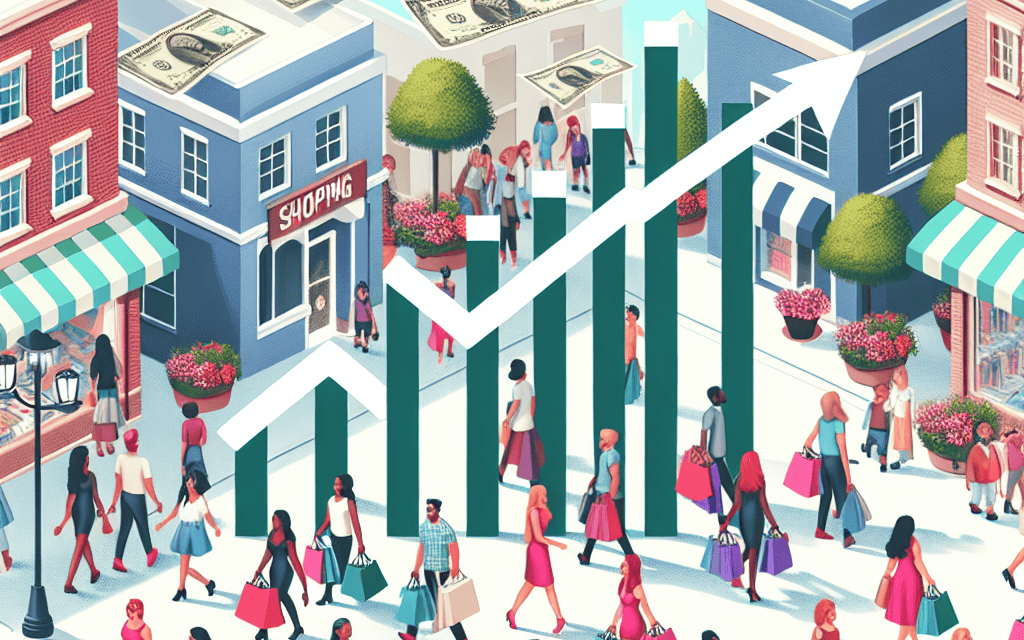“Affluent Americans: Driving Retail Growth, Fueling Economic Momentum.”
Introduction
Affluent Americans have emerged as a driving force in retail spending, significantly bolstering the U.S. economy. As the wealthiest segment of the population continues to enjoy substantial disposable income, their consumer behavior plays a pivotal role in shaping economic trends. This demographic’s robust spending patterns have not only sustained but also accelerated growth across various retail sectors, from luxury goods to everyday essentials. Their financial resilience and willingness to invest in high-end products and services have provided a crucial buffer against economic uncertainties, ensuring a steady flow of capital into the market. Consequently, the spending habits of affluent Americans have become a cornerstone of economic vitality, underscoring their influence in propelling the nation’s economic engine forward.
Impact Of Affluent Americans On Retail Spending Trends
Affluent Americans have long played a pivotal role in shaping retail spending trends, and their influence continues to be a significant driver of the U.S. economy. As the wealthiest segment of the population, these individuals possess substantial disposable income, which they channel into various sectors, thereby stimulating economic growth. Understanding the impact of affluent Americans on retail spending trends requires an examination of their consumption patterns, preferences, and the broader economic implications of their spending habits.
To begin with, affluent Americans tend to have distinct spending patterns that set them apart from other consumer groups. They are more likely to invest in luxury goods, high-end services, and premium experiences, which in turn fuels the growth of niche markets catering to these preferences. For instance, luxury fashion brands, high-end automotive manufacturers, and exclusive travel services often see a significant portion of their revenue generated by affluent consumers. This demand for premium products not only supports these industries but also encourages innovation and competition, as companies strive to meet the evolving expectations of their wealthy clientele.
Moreover, the spending habits of affluent Americans have a ripple effect on the broader economy. Their propensity to spend on luxury items and services often leads to job creation in sectors such as retail, hospitality, and entertainment. As these industries expand to accommodate the demands of affluent consumers, they generate employment opportunities, thereby contributing to economic stability and growth. Additionally, the taxes collected from these high-value transactions provide essential revenue for government programs and infrastructure projects, further underscoring the economic significance of affluent spending.
In addition to their direct impact on specific industries, affluent Americans also influence retail spending trends through their investment activities. Many affluent individuals are active investors, and their financial decisions can shape market dynamics. For example, their investments in real estate, technology, and other sectors can drive innovation and development, leading to new products and services that eventually reach a broader consumer base. This investment activity not only enhances the economic landscape but also creates opportunities for other consumers to benefit from advancements initially driven by affluent spending.
Furthermore, the preferences of affluent Americans often set trends that trickle down to other consumer segments. As trendsetters, their choices in fashion, technology, and lifestyle can influence the purchasing decisions of a wider audience. This phenomenon, known as the “trickle-down effect,” can lead to increased demand for certain products and services across different income levels, thereby amplifying the impact of affluent spending on the overall economy.
However, it is important to acknowledge that the concentration of wealth among affluent Americans also raises questions about economic inequality. While their spending power can drive economic growth, it can also exacerbate disparities between different income groups. Policymakers and economists must consider these dynamics when crafting strategies to ensure that the benefits of affluent spending are distributed more equitably across society.
In conclusion, affluent Americans play a crucial role in shaping retail spending trends and driving economic growth in the United States. Their distinct consumption patterns, investment activities, and trendsetting influence have far-reaching implications for various industries and the broader economy. While their spending power is undeniably beneficial, it is essential to address the challenges posed by economic inequality to ensure a more balanced and inclusive economic landscape.
How Wealthy Consumers Drive Economic Growth In The US
Affluent Americans have long played a pivotal role in shaping the economic landscape of the United States, and their influence on retail spending is a testament to their significant impact. As the economy continues to evolve, the spending habits of wealthy consumers have become a crucial driver of economic growth, underscoring the intricate relationship between consumer behavior and economic vitality. Understanding this dynamic is essential for comprehending the broader economic trends that characterize the contemporary US economy.
To begin with, affluent consumers possess a disproportionate amount of purchasing power, which enables them to make substantial contributions to retail spending. This demographic, often defined by high income and substantial assets, tends to spend more on luxury goods, high-end services, and premium experiences. Their spending patterns not only support businesses that cater to upscale markets but also create a ripple effect throughout the economy. For instance, when affluent individuals purchase luxury vehicles, designer clothing, or fine dining experiences, they stimulate demand in these sectors, leading to job creation and increased economic activity.
Moreover, the spending behavior of wealthy consumers often sets trends that influence the broader market. As trendsetters, affluent Americans have the ability to shape consumer preferences and drive demand for new products and services. This influence extends beyond luxury markets, as mainstream consumers often aspire to emulate the lifestyles of the affluent. Consequently, businesses across various sectors strive to capture the attention of wealthy consumers, leading to innovation and diversification in product offerings. This dynamic fosters a competitive market environment that ultimately benefits the economy by encouraging growth and development.
In addition to their direct spending, affluent Americans also contribute to economic growth through investments. Their financial resources allow them to invest in stocks, real estate, and other assets, which in turn fuels economic expansion. These investments provide capital for businesses to grow, innovate, and create jobs, further bolstering the economy. Furthermore, the philanthropic activities of wealthy individuals often lead to significant contributions to education, healthcare, and other social causes, which can have long-term positive effects on economic development.
However, it is important to acknowledge the potential challenges associated with the concentration of wealth and its impact on economic growth. While affluent consumers drive significant economic activity, income inequality remains a pressing issue. The disparity in wealth distribution can lead to economic imbalances, where the benefits of growth are not evenly shared across all segments of society. Addressing these disparities is crucial for ensuring sustainable economic growth that benefits a broader population.
In conclusion, affluent Americans play a vital role in driving retail spending and boosting the US economy. Their purchasing power, trendsetting influence, and investment activities contribute significantly to economic growth. While their impact is undeniably positive, it is essential to consider the broader implications of wealth concentration and work towards a more equitable distribution of economic benefits. By understanding the complex interplay between affluent consumers and the economy, policymakers and businesses can better navigate the challenges and opportunities that lie ahead, ensuring a prosperous future for all.
The Role Of High-Income Households In Shaping Retail Markets
Affluent Americans have long played a pivotal role in shaping the retail markets of the United States, and their influence continues to be a driving force in the nation’s economic landscape. As high-income households wield significant purchasing power, their spending habits not only dictate trends within the retail sector but also contribute substantially to the overall health of the U.S. economy. Understanding the dynamics of this relationship is crucial for businesses and policymakers alike, as it provides insights into consumer behavior and economic resilience.
To begin with, high-income households are characterized by their discretionary spending capacity, which allows them to indulge in luxury goods, premium services, and high-end experiences. This segment of the population is less affected by economic downturns compared to their lower-income counterparts, enabling them to maintain or even increase their spending during challenging times. Consequently, their consistent consumption patterns provide a stabilizing effect on the retail market, ensuring a steady flow of revenue for businesses that cater to this demographic. Moreover, affluent consumers often set the tone for market trends, as their preferences and purchasing decisions influence the offerings of retailers across various sectors.
In addition to their direct impact on retail markets, affluent Americans also contribute to the economy through their investments in real estate, stocks, and other financial instruments. These investments generate wealth that further fuels their spending power, creating a cycle of economic activity that benefits multiple industries. For instance, the demand for luxury real estate not only boosts the housing market but also stimulates related sectors such as construction, interior design, and home furnishings. Similarly, their investments in the stock market can lead to increased capital for businesses, enabling them to expand operations and create jobs.
Furthermore, the spending habits of high-income households have a ripple effect on the broader economy. As these consumers purchase goods and services, they drive demand for production and supply chain activities, which in turn supports employment and income generation across various levels of the economy. This multiplier effect underscores the importance of affluent Americans in sustaining economic growth and stability. Additionally, their patronage of high-end retail establishments often leads to the creation of niche markets and specialized services, fostering innovation and competition within the industry.
However, it is important to recognize that the concentration of wealth and spending power among affluent Americans also presents challenges. The disparity in income distribution can lead to economic imbalances, where the benefits of growth are not equitably shared across all segments of society. This underscores the need for policies that promote inclusive growth and ensure that the economic contributions of high-income households translate into broader societal benefits.
In conclusion, affluent Americans play a crucial role in shaping retail markets and bolstering the U.S. economy through their significant purchasing power and investment activities. Their influence extends beyond direct consumption, as their spending habits drive demand, stimulate innovation, and support employment across various sectors. While their contributions are vital to economic stability, it is essential to address the challenges posed by income inequality to ensure that the benefits of their spending are widely distributed. By understanding the dynamics of high-income households, businesses and policymakers can better navigate the complexities of the retail market and foster a more inclusive and resilient economy.
Affluent Americans And Their Influence On Consumer Confidence

Affluent Americans have long played a pivotal role in shaping the economic landscape of the United States, and their influence on consumer confidence is particularly noteworthy. As the nation continues to navigate the complexities of economic recovery and growth, the spending habits of wealthy individuals have emerged as a significant driver of retail spending, thereby bolstering the overall economy. This phenomenon is not only a testament to the purchasing power of affluent Americans but also highlights the intricate relationship between consumer confidence and economic vitality.
To begin with, it is essential to understand the dynamics of consumer confidence and its impact on economic activity. Consumer confidence, a measure of how optimistic or pessimistic consumers are regarding their financial situation and the overall state of the economy, plays a crucial role in determining spending behavior. When confidence is high, individuals are more likely to make purchases, invest in new ventures, and contribute to economic growth. Conversely, when confidence wanes, spending tends to decrease, leading to slower economic progress. In this context, affluent Americans, with their substantial disposable incomes, have the capacity to significantly influence consumer confidence and, by extension, the broader economy.
Moreover, the spending patterns of affluent Americans often set trends that ripple through various sectors of the economy. For instance, luxury goods and high-end services frequently experience a surge in demand when wealthy consumers feel confident about their financial prospects. This increased demand not only benefits retailers and service providers but also stimulates job creation and investment in these industries. Furthermore, the trickle-down effect of affluent spending can lead to enhanced economic activity in related sectors, such as manufacturing, logistics, and marketing, thereby creating a multiplier effect that amplifies the initial economic boost.
In addition to their direct impact on retail spending, affluent Americans also play a crucial role in shaping consumer sentiment through their investment activities. As major stakeholders in financial markets, their investment decisions can influence market trends and, consequently, the economic outlook. When affluent individuals invest in stocks, real estate, or other assets, they contribute to market stability and growth, which can enhance consumer confidence across the board. This, in turn, encourages broader participation in the economy, as individuals from various income brackets feel more secure in their financial decisions.
Furthermore, the philanthropic endeavors of affluent Americans can also contribute to bolstering consumer confidence. By supporting charitable causes and community initiatives, wealthy individuals can help address social issues and improve the quality of life for many, thereby fostering a sense of optimism and stability within society. This positive sentiment can translate into increased consumer confidence, as individuals feel more secure in their communities and more willing to engage in economic activities.
In conclusion, the influence of affluent Americans on consumer confidence and the US economy is multifaceted and profound. Through their spending habits, investment activities, and philanthropic efforts, wealthy individuals have the capacity to drive retail spending and stimulate economic growth. As the nation continues to navigate the challenges of economic recovery, the role of affluent Americans in shaping consumer confidence will remain a critical factor in determining the trajectory of the US economy. By understanding and leveraging this influence, policymakers and business leaders can work towards fostering a more robust and resilient economic environment for all.
Luxury Retail: A Key Contributor To The US Economy
Affluent Americans have long been a driving force in the retail sector, and their spending habits continue to play a pivotal role in bolstering the US economy. As the wealthiest segment of the population, these consumers possess significant disposable income, which they frequently channel into luxury goods and services. This spending not only fuels the growth of high-end retail brands but also contributes to broader economic stability and expansion. In recent years, the luxury retail market has experienced a notable upswing, largely due to the purchasing power of affluent individuals. This trend is evident in the robust performance of luxury brands, which have reported increased sales and expanded market presence. The demand for premium products, ranging from designer fashion and jewelry to high-end automobiles and exclusive travel experiences, underscores the importance of this consumer segment in driving economic activity.
Moreover, the impact of affluent Americans on the retail sector extends beyond mere consumption. Their spending patterns often set trends that influence the broader market, encouraging innovation and competition among retailers. As luxury brands strive to meet the expectations of discerning customers, they invest in product development, marketing strategies, and customer service enhancements. This, in turn, stimulates job creation and economic growth, as companies seek to attract and retain top talent to maintain their competitive edge. Furthermore, the influence of affluent consumers is not confined to traditional retail spaces. The rise of e-commerce has provided luxury brands with new avenues to reach their target audience, allowing for a more personalized and convenient shopping experience. Online platforms have become essential for engaging with affluent consumers, who value both the exclusivity and accessibility of luxury goods. This digital transformation has further amplified the economic impact of affluent spending, as it enables brands to tap into a global market and expand their customer base.
In addition to driving retail sales, affluent Americans also contribute to the economy through their investments in real estate, art, and other high-value assets. These investments often appreciate over time, generating wealth that can be reinvested into the economy. The real estate market, in particular, benefits from the purchasing power of affluent individuals, who are often willing to pay premium prices for luxury properties. This demand supports property values and stimulates construction and development projects, creating jobs and boosting local economies. It is also important to consider the philanthropic contributions of affluent Americans, which further enhance their economic impact. Many wealthy individuals and families engage in charitable giving, supporting a wide range of causes and organizations. These donations provide critical funding for initiatives in education, healthcare, and the arts, among other areas, fostering social and economic development.
In conclusion, the spending habits of affluent Americans are a key driver of the luxury retail sector and, by extension, the US economy. Their influence extends beyond mere consumption, shaping market trends and encouraging innovation and investment. As the economy continues to evolve, the role of affluent consumers in sustaining growth and prosperity remains significant. By understanding and leveraging the preferences and behaviors of this influential demographic, retailers and policymakers can better navigate the complexities of the modern economic landscape, ensuring continued success and stability.
Spending Habits Of The Wealthy And Their Economic Implications
Affluent Americans have long been a driving force in the United States economy, and their spending habits continue to play a pivotal role in shaping economic trends. As the wealthiest segment of the population, these individuals possess significant purchasing power, which they frequently exercise in ways that have far-reaching implications for the broader economy. Understanding the spending habits of affluent Americans is crucial for comprehending the dynamics of retail spending and its impact on economic growth.
To begin with, affluent Americans tend to allocate a substantial portion of their income to discretionary spending. This includes luxury goods, high-end services, and experiences that cater to their desire for exclusivity and quality. Consequently, industries such as luxury retail, travel, and hospitality often experience robust growth, driven by the demand from this demographic. For instance, high-end fashion brands and luxury car manufacturers frequently report strong sales figures, buoyed by the willingness of wealthy consumers to invest in premium products. This spending not only supports these industries but also contributes to job creation and economic stability.
Moreover, the spending patterns of affluent Americans often set trends that trickle down to other segments of the population. As these individuals adopt new technologies, fashion styles, or lifestyle choices, they inadvertently influence the preferences of middle-class consumers. This phenomenon, known as the “trickle-down effect,” can lead to increased demand for certain products and services across a broader consumer base. As a result, companies that successfully cater to the tastes of affluent consumers often find themselves well-positioned to capture a larger market share.
In addition to their direct spending, affluent Americans also contribute to the economy through investments. With substantial financial resources at their disposal, they are more likely to invest in stocks, real estate, and other assets. These investments can stimulate economic growth by providing capital for businesses to expand and innovate. Furthermore, the financial decisions of wealthy individuals can have a stabilizing effect on markets, as their investments often reflect confidence in the economy’s future prospects.
However, it is important to recognize that the spending habits of affluent Americans can also exacerbate economic inequality. As wealthier individuals continue to spend and invest, they accumulate more assets, which can widen the gap between the rich and the poor. This growing disparity can lead to social and economic challenges, as lower-income individuals may struggle to keep pace with rising costs and limited access to opportunities. Policymakers must therefore consider strategies to address these inequalities while still encouraging the positive economic contributions of affluent consumers.
In conclusion, the spending habits of affluent Americans are a significant driver of retail spending and economic growth in the United States. Their discretionary spending supports various industries, sets consumer trends, and provides capital for investment. However, the potential for increased economic inequality necessitates a balanced approach to harnessing the benefits of their spending while addressing the challenges it may pose. By understanding and analyzing these dynamics, stakeholders can better navigate the complexities of the modern economy and work towards a more equitable and prosperous future for all.
The Ripple Effect Of Affluent Spending On Small Businesses
Affluent Americans have long been a driving force in the U.S. economy, and their spending habits continue to play a crucial role in shaping the retail landscape. As the wealthiest segment of the population increases its consumption, the ripple effects are felt across various sectors, particularly among small businesses. This phenomenon underscores the interconnectedness of economic activities and highlights the importance of understanding how affluent spending can stimulate broader economic growth.
To begin with, affluent consumers possess significant disposable income, allowing them to spend on luxury goods, high-end services, and unique experiences. This spending behavior not only benefits large retailers and luxury brands but also extends to small businesses that cater to niche markets. For instance, boutique shops, artisanal food producers, and bespoke service providers often see increased demand from affluent customers seeking personalized and exclusive offerings. Consequently, these small businesses experience growth, which in turn contributes to job creation and local economic development.
Moreover, the spending patterns of affluent Americans often set trends that influence broader consumer behavior. As these individuals invest in innovative products and services, they inadvertently drive demand for new offerings. Small businesses, known for their agility and ability to adapt quickly to market changes, are well-positioned to capitalize on these emerging trends. By aligning their products and services with the preferences of affluent consumers, small businesses can tap into new revenue streams and expand their customer base.
In addition to direct spending, affluent Americans also contribute to the economy through investments in small businesses. Many wealthy individuals are increasingly interested in supporting startups and entrepreneurial ventures, either through direct investment or by participating in venture capital funds. This influx of capital provides small businesses with the resources needed to innovate, scale operations, and compete in a dynamic market. As these businesses grow, they create additional employment opportunities and contribute to the overall economic vitality of their communities.
Furthermore, the philanthropic activities of affluent individuals often benefit small businesses indirectly. Many wealthy Americans are committed to giving back to their communities, and their charitable contributions frequently support initiatives that bolster local economies. For example, donations to educational programs, workforce development initiatives, and community development projects can enhance the skills and capabilities of the local workforce, making it easier for small businesses to find qualified employees. Additionally, grants and funding for small business development programs can provide entrepreneurs with the tools and resources they need to succeed.
However, it is important to recognize that the influence of affluent spending is not without its challenges. The concentration of wealth among a small segment of the population can lead to economic disparities, and small businesses that do not cater to affluent consumers may struggle to compete. To address these issues, policymakers and business leaders must work together to create an inclusive economic environment that supports all types of businesses and ensures that the benefits of affluent spending are distributed more equitably.
In conclusion, the spending habits of affluent Americans have a profound impact on the U.S. economy, particularly in the realm of small businesses. By driving demand for unique products and services, providing investment capital, and supporting philanthropic initiatives, affluent consumers play a pivotal role in fostering economic growth and development. As the economy continues to evolve, understanding and leveraging the ripple effects of affluent spending will be essential for ensuring a vibrant and inclusive economic future.
Q&A
1. **Question:** How do affluent Americans influence retail spending in the US?
– **Answer:** Affluent Americans drive a significant portion of retail spending due to their higher disposable incomes, allowing them to purchase luxury goods and services, which boosts overall economic activity.
2. **Question:** What sectors benefit the most from the spending habits of affluent Americans?
– **Answer:** Luxury goods, high-end fashion, premium automotive, fine dining, and travel sectors benefit the most from affluent Americans’ spending habits.
3. **Question:** How does the spending of affluent Americans impact the US economy?
– **Answer:** Their spending stimulates economic growth by increasing demand for goods and services, supporting jobs, and contributing to higher GDP levels.
4. **Question:** What role do affluent Americans play in consumer confidence?
– **Answer:** Affluent Americans often set trends and influence consumer confidence, as their spending patterns can signal economic optimism or caution to other consumers.
5. **Question:** How does the spending behavior of affluent Americans affect income inequality?
– **Answer:** While their spending boosts the economy, it can also exacerbate income inequality by concentrating wealth and economic power among a smaller segment of the population.
6. **Question:** What are some challenges associated with relying on affluent Americans for economic growth?
– **Answer:** Economic growth driven by affluent spending can be volatile, as it heavily depends on their financial market performance and economic confidence, which can fluctuate.
7. **Question:** How do changes in tax policy affect the spending of affluent Americans?
– **Answer:** Tax policies that increase disposable income for affluent Americans can lead to higher spending, while policies that reduce their income may lead to decreased spending and economic activity.
Conclusion
Affluent Americans have played a significant role in propelling retail spending and boosting the US economy. Their robust purchasing power and consumer confidence have driven demand across various sectors, from luxury goods to everyday essentials. This spending behavior has not only supported retail growth but also contributed to broader economic stability and expansion. By maintaining high levels of consumption, affluent consumers have helped sustain businesses, preserve jobs, and stimulate economic activity, underscoring their critical influence on the economic landscape. However, this reliance on affluent spending also highlights potential vulnerabilities, as economic disparities may lead to uneven growth and sustainability challenges in the long term.





